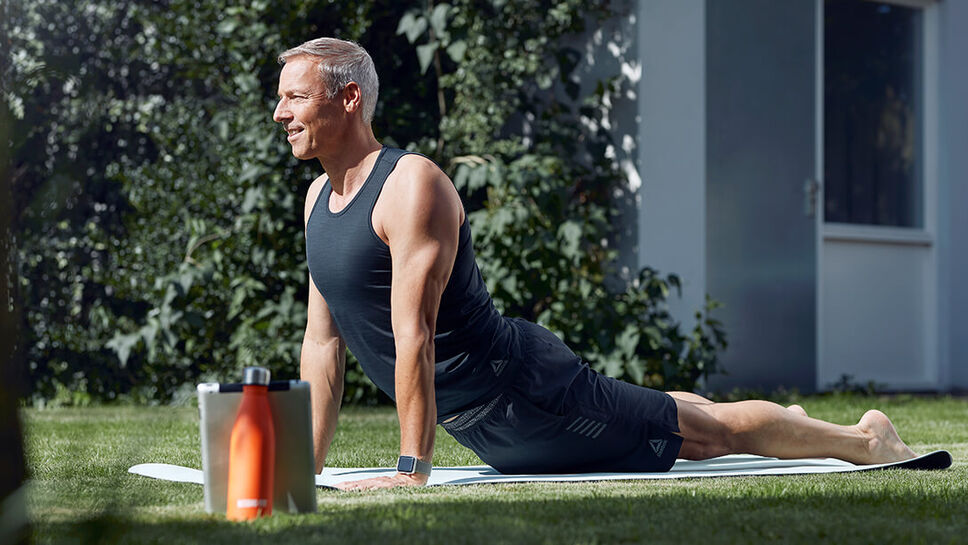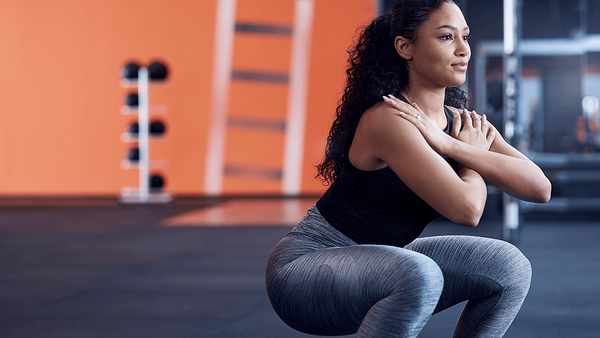What is stress?
Stress is a normal reaction of the body to uncertain situations, that keeps us alert. At work, for example, stress could help you to stay focused better and help you to be more effective so you can perform better. This state of tension, which we call stress, prepares us for action and this causes us to react to threatening situations. But when the stress load is greater than we can bear, it causes physical and mental ailments.
Reduce stress with exercise
Exercising regularly is a great way to reduce stress. Working out in the gym, taking a walk outside, riding a bike, swimming, doing yoga, playing with your kids ... anything goes! Several studies have shown that dynamic outdoor activities help reduce physical and mental problems caused by stress. Exercising helps you to let go of negative thoughts and lets you focus on your body instead.
5 exercises to reduce stress
One of the best ways to reduce stress is with conscious breathing. If you breath calmly and silently, you stimulate your nervous system and promote relaxation. Practicing yoga is a great way to combine physical exercise and breathing. Here we explain 5 common exercises in yoga that are very useful to overcome stress:
1. Fetal position
Get down on your knees and bring your glutes towards the heels. Lean forward and rest your forehead on the ground. Stretch your hands out in front of you, or put them at your sides. Breathe through your nose and try to get the breath through your lungs to your abdomen. Stay in this position for as long as you feel comfortable.
2. Knees to chest
Lie on your back and bring your knees to your chest. Grab your knees with your hands, and try to wrap your arms around them, interlocking your fingers if you can do it comfortably. Close your eyes. The head and shoulders remain on the ground. Breathe deeply from your abdomen and hold the pose for as long as you need.
3. Spinal twist
Lie on your back. Bring your knees slightly to your chest keeping your shins parallel to the ground. Extend your arms. As you exhale, first place your knees on the right (towards the ground) and your head on the left. Stay in this pose for 1 to 2 minutes. While you inhale, bring your legs to the center. As you exhale repeat the exercise on the other side (legs to the left, head to the right).
4. The cobra posture
Lie on your stomach, place your hands on the floor at shoulder height, and push your body up as you inhale. Keep your arms slightly bent and your pelvis on the floor. As you exhale, gently lower your body.
5. Lean forward
Stand up straight and keep your feet together. As you exhale, lean forward from your pelvis and bring your head toward the floor. Bend your knees so your belly is in contact with your thighs. You can put your hands on the floor, or grab your ankles or calves, whichever is more comfortable for you. Hold this position for about a minute and gently return to the upright position.
Reduce stress with a healthy diet
A healthy diet also helps you deal with stress. Eating infrequently can cause your blood sugar to drop, which can make you irritable. On the other hand, eating too much can cause an uncomfortable feeling of drowsiness. Healthy eating helps you cope with stress. Small but frequent meals help keep your blood sugar level. This creates a balance within your body, increases your energy, keeps you focused and prevents sudden mood swings.
Choose fresh foods that are rich in vitamin B, vitamin C, magnesium, zinc and omega 3. In addition to good nutrition, dietary supplements can also help you better cope with stress or recover from a stressful period. If you need any special supplement, check out the website of our sports nutrition partner NXT Level. Basic-Fit members who have the app enjoy a 10% discount on supplements or click on this link.
Tips to relieve stress at work
It's also important to keep an eye on the way you handle pressure at work. Pay attention to the warning signs your body sends: frequent headaches, trouble sleeping, irritability, loss of interest in your work. It’s important to intervene as soon as possible. If you don't, you run the risk of escalating the situation.
Be realistic about the goals/objectives you want to achieve. Unrealistic goals are a trap. No project, situation or decision is completely perfect. Don't be such a perfectionist and enjoy life in a healthy way.
This blog is written by one of our Personal Trainers, Joyce Mohringer.





